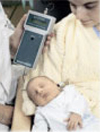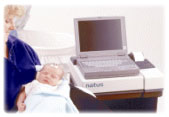About Newborn Hearing Screening
Why should my baby’s hearing be tested?
Approximately 3 newborns per 1,000 have permanent hearing loss. Newborn hearing loss is one of the most frequently occurring disorders present at birth. Over 50% of babies born with hearing loss have no known risk factors for hearing loss.
The first two years of your child's life are the most critical for learning speech and language. It is important to diagnose hearing problems early because a hearing loss can prevent your baby from learning speech and language. By identifying hearing loss early in infancy, children can receive early intervention services and be given the opportunity to develop normal language skills. Because infants are unable to tell us they can't hear, it is important for all newborns to be screened for hearing loss.
How does the test work?
There are two types of screening tests that can be used. Both tests work best when your baby is quiet and sleeping. Having your baby warm, securely bundled, just fed and in a clean diaper all help to achieve quick and easy testing, as well as accurate test results.
Both tests are very safe and will not hurt your baby – most babies sleep right through the test. Both tests screen for a mild hearing loss or greater. Your baby will have one or both of the tests. Your hospital or physician can tell you which test your baby receives.
- Evoked otoacoustic emissions (EOAE)
- Brainstem auditory evoked response (BAER)
Evoked Otoacoustic Emissions (EOAE)

A soft rubber earpiece is placed in your baby's outer ear and makes a soft clicking sound. Healthy ears will “echo” the click sound back to a microphone inside the earpiece that is in your baby's ear.
Brainstem Auditory Evoked Response (BAER)

Special sensors are placed on your baby's forehead and behind each ear.
A soft rubber earphone is placed in your baby's outer ear and sends a series of quiet sounds into your sleeping baby's ear.
The sensors that are placed on your baby's skin measure the responses of your baby's hearing nerve. These responses are recorded and stored in a computer.
What does a newborn hearing screening test tell us?
A hearing screening test screens for a mild hearing loss or greater. A hearing screening is not a diagnosis.
If a baby does not pass the hearing screening and is referred for more testing, it means that infant is at risk for hearing loss, not necessarily that they have a hearing loss. They should be referred for a diagnostic audiologic evaluation.
The most common reasons an infant may not pass the hearing screening are:
- Middle ear fluid or infection
- An ear canal blocked with debris
- A permanent, mild or greater hearing loss (3 in 1,000 newborns)
What if my baby is referred for more testing?
If your baby is referred for more testing, it does not necessarily mean they have a hearing loss. It is important that you return for the follow up screening test before 1 month of age. Most babies will pass the second screening test.
If your baby is referred for a diagnostic audiologic evaluation it is important to have that evaluation as soon as possible. This way, if your baby does have a hearing loss, you can provide your baby with appropriate treatment and care.
What if my baby passes the hearing screening?
If your baby passes the hearing screening, but you still have concerns regarding your baby’s responses to sounds, talk to your baby’s doctor. Children who get a lot of ear infections, a serious infection such as meningitis, have a chronic illness, or have a family history of hearing loss can be at risk for developing a hearing loss later. If you have any concerns about your baby's hearing, tell your baby's doctor as soon as possible. Your doctor can provide medical help and make referrals for further testing.